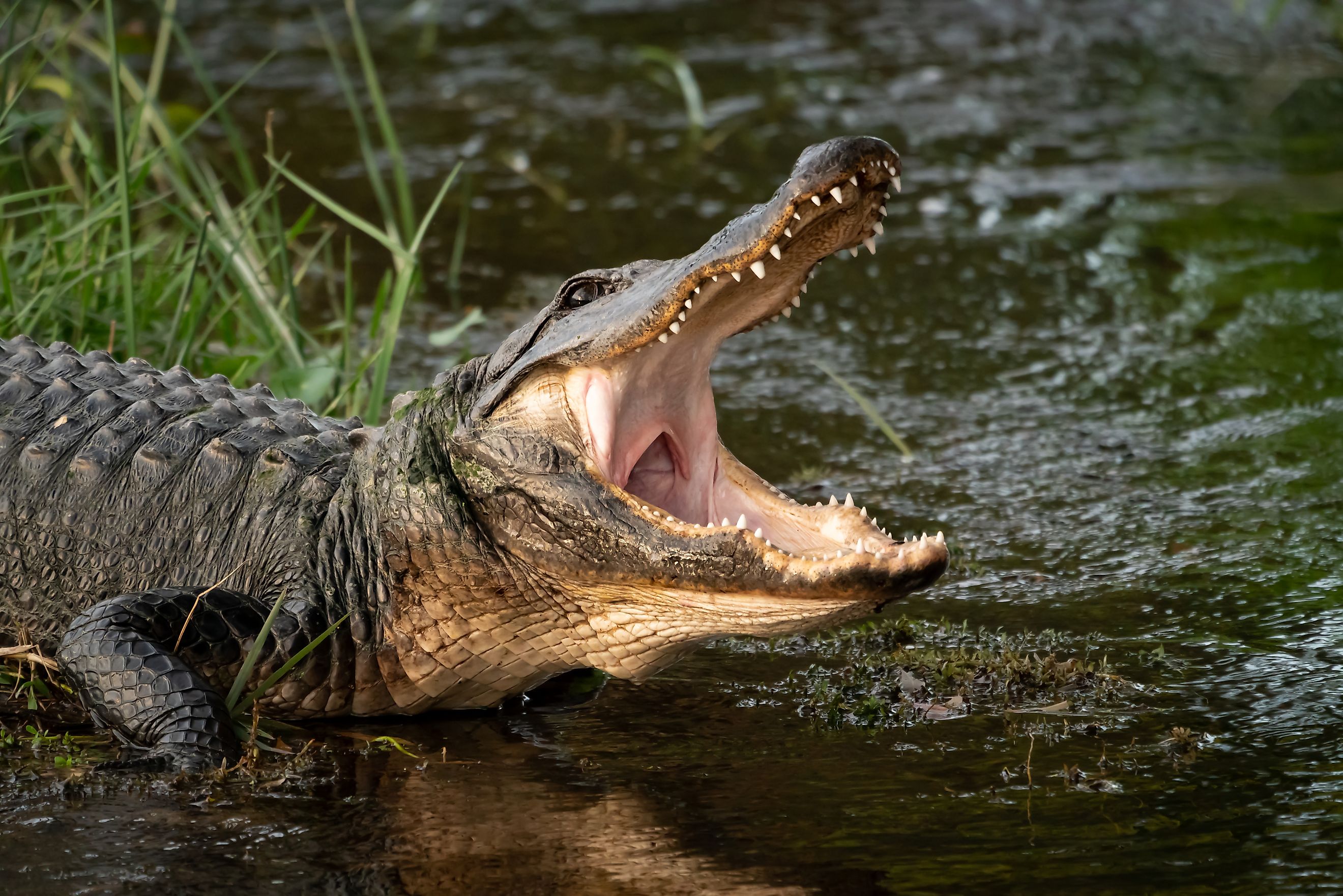
The 12 Deadliest Animals in Mississippi
Mississippi is known for many things: Catfish, Bluegrass, and Elvis Presley, to name a few. The grandeur of the Mississippi River is undeniably one of the state’s most significant assets, having inspired the literary work of artists like Mark Twain, and the river itself is the 13th largest in the world. Besides the world-class barbecue and country music, the Magnolia State has its fair share of dangerous critters to watch for. From your regular fare, like snakes and bears, to the more exotic and aquatic, Mississippi can challenge the unprepared. Thankfully, these creatures are listed below so you can be fully aware of your next trip down to Mississippi.
Eastern Diamondback Rattlesnake
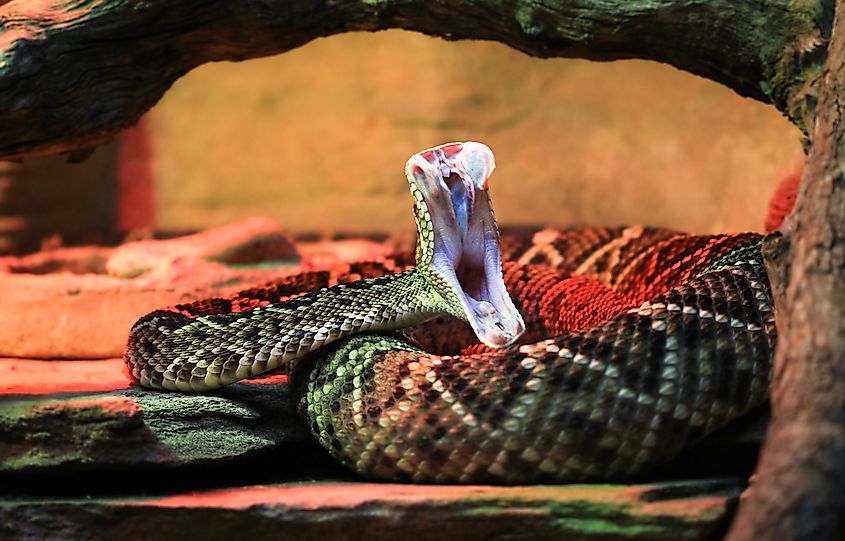
Adult eastern diamondback rattlesnake (Crotalus adamanteus).
The Eastern Diamondback is the largest venomous snake in North America. These large pit vipers can grow to six and a half feet in length and more than 35 pounds, and some claim to have seen cases where this massive snake reached eight feet long from tip to tail. The Eastern Diamondback primarily feasts on rabbits and inhabits the southern portion of Mississippi in addition to Florida, North Carolina, and Louisiana.
These snakes have a highly hemorrhagic venom, which causes blood vessels inside the body to break down and can lead to cardiovascular shock. However, the potency of this venom has been thankfully offset due to the widespread distribution of antidotes. To avoid this snake, keep an ear open for its distinctive rattle tail, which will sound if the animal feels threatened.
Timber Rattlesnake
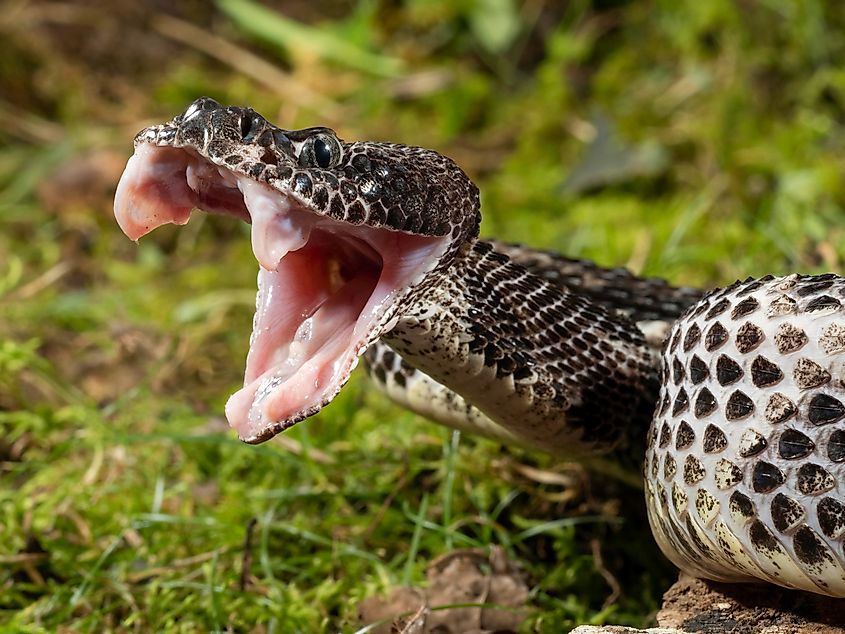
This is one of the most dangerous rattlesnakes in the entire country. Primarily found in the northeastern portion of the US, the Timber Rattlesnake is also present throughout Mississippi, much to the dismay of some residents. The animal's presence in the original thirteen colonies made it a prime candidate for immortalization in 1775 on the Gadsden Flag as a symbol against British tyranny during the Revolutionary War. Typically growing between five to six feet, this hefty rattlesnake is not one to trifle with.
The northern version of this snake packs hemorrhagic venom, while the southern varieties have bites that transmit a strong neurotoxin. In 2016, the Centers for Disease Control and Prevention approximated that between 6,000-8,000 people are bitten by a venomous snake annually, and a study by Forrester et al. in 2018 found that six Americans die from snakebites annually. Nearly half of those who identified the snake that bit them said it was a rattlesnake that did it, demonstrating the danger these reptiles possess.
Mosquitos
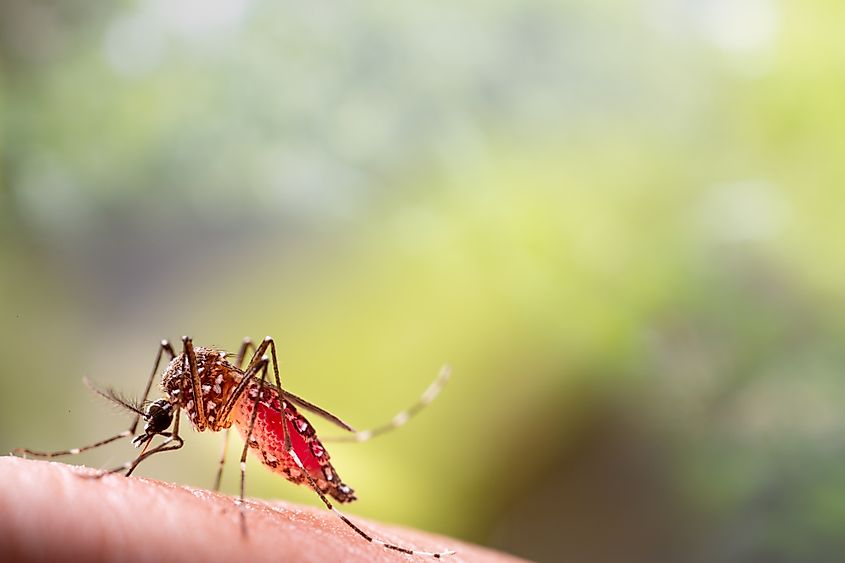
Close-up of a mosquito feeding on human blood.
You may think of mosquitos only as a garden variety pest, but you would be mistaken. These little insects punch well above their weight class in lethality thanks to the viruses they transmit while feeding. Diseases such as West Nile and Zika can be transferred while the mosquito draws blood from its victim. The common mosquito kills more humans each year than any other animal and is not to be underestimated.
Sure, you will probably get nothing worse than an itchy spot for a few days, but why take the chance? Wear loose-fitting clothes with long-sleeved shirts and pants to prevent mosquito bites. For an added layer of protection, treat your clothing with permethrin, a substance that mosquitos cannot stand.
American Alligators
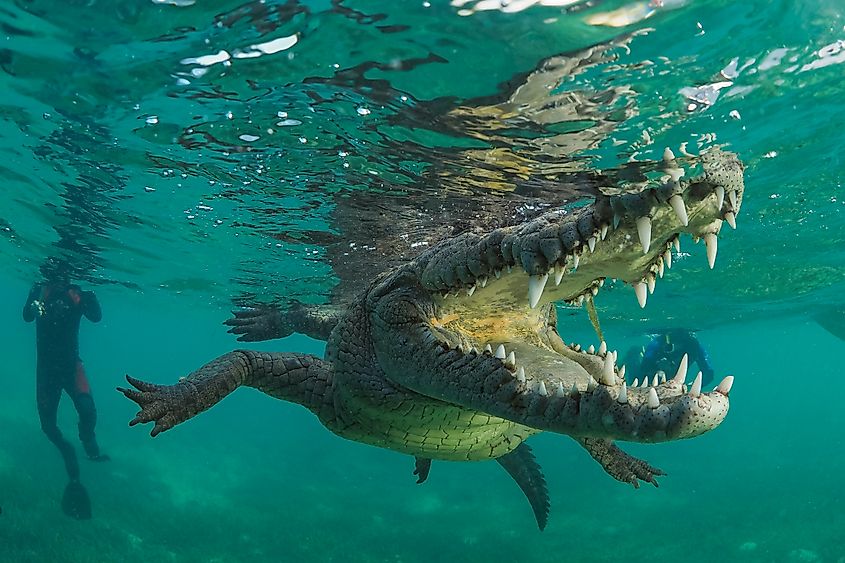
American crocodile (Crocodylus acutus), Jardines de la Reina, Cuba.
In 2023, a group of Mississippi hunters captured the largest alligator ever recorded in the state’s history. The animal was over 14 feet long and weighed more than 800 pounds. While not all ‘gators are as large as this behemoth, the American Alligator is a reality of life for those who live near southeastern waterways. American Alligators are known for their broad, round noses and dark coloration.
Preferring freshwater locations such as rivers, you may want to keep an eye out for signage around your swimming hole warning about possible alligator infestations. While alligator attacks are rare, such large creatures are lethal if provoked or if they are hungry. Leave the crocodile hunting to the experts and stay as far away from these animals as possible.
Portuguese Man-of-War
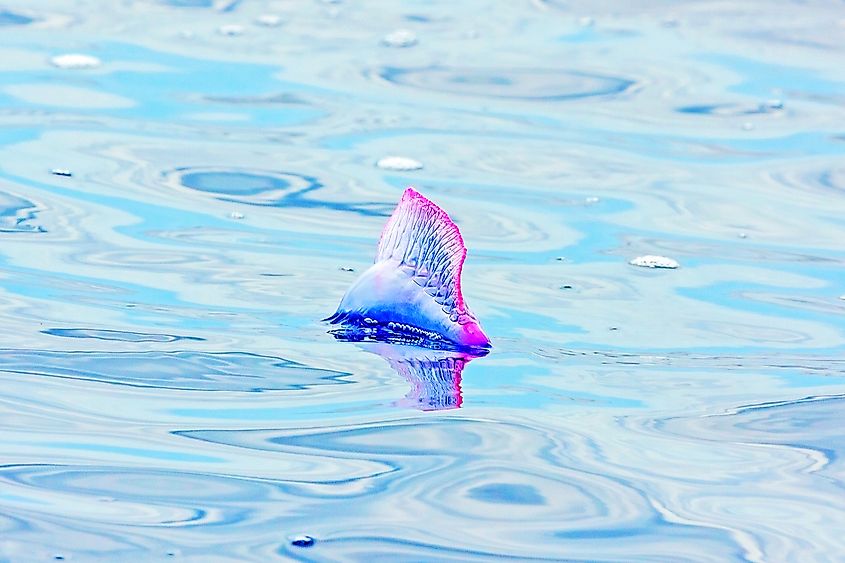
Close-up of a Portuguese Man-of-War.
The Portuguese Man-of-War is occasionally found off the coast of Mississippi, particularly after strong winds. This enormous seafaring creature is not a jellyfish at all but a close cousin. Strangely enough, the Man-of-War is several creatures known as zooids working together in concert to travel, eat, and procreate.
The creature gets its name from resembling an 18th-century Portuguese galleon at full mast. The floating portion of its body may be blue or pink above the surface, while below the water, tentacles can trail between 30 to 100 feet below the surface of the ocean. This ocean-faring lifeform has a potent sting that is rarely deadly, with fatalities extremely uncommon.
Black Widow Spiders
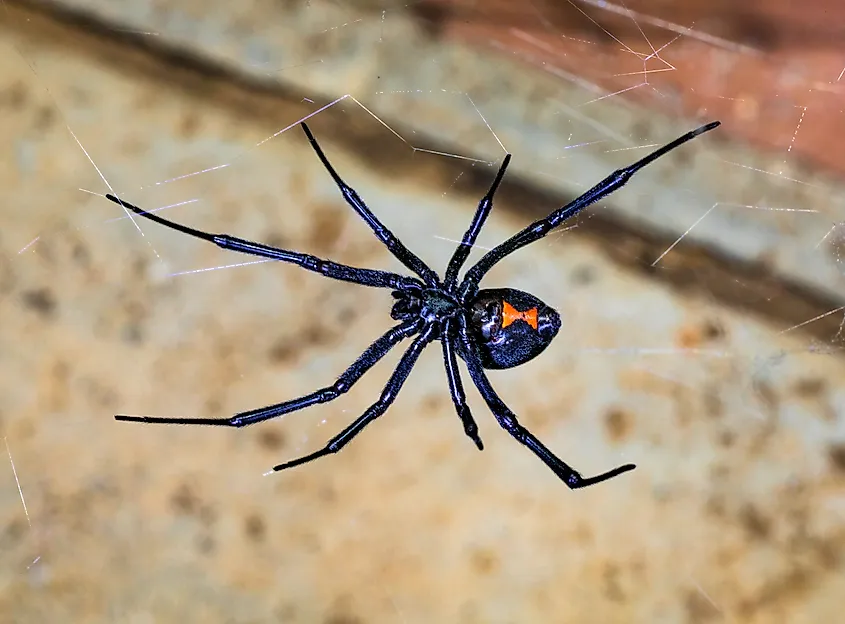
Close-up of a Black Widow Spider, poised and waiting for prey in its web.
Besides reptilian predators, Mississippi is also home to other venomous creatures. If eight hairy legs make you squeamish, you may want to consider vacationing somewhere else. The infamous Black Widow spider is infamous for its venomous bite. When bitten by this spider, seek immediate medical attention as its venom can be up to 15 times stronger than that of some rattlesnakes.
This terrifying creature is much smaller than a pit viper, but that fact only makes it that much harder to avoid. This spider is not hard to recognize thanks to its jet-black body and the distinctive red hourglass shape along its abdomen. Black widows like to live in unlit, hard-to-reach areas. Wood structures are especially appealing to these arachnids, so be extra careful when cleaning up around the woodshed.
Brown Recluse Spiders
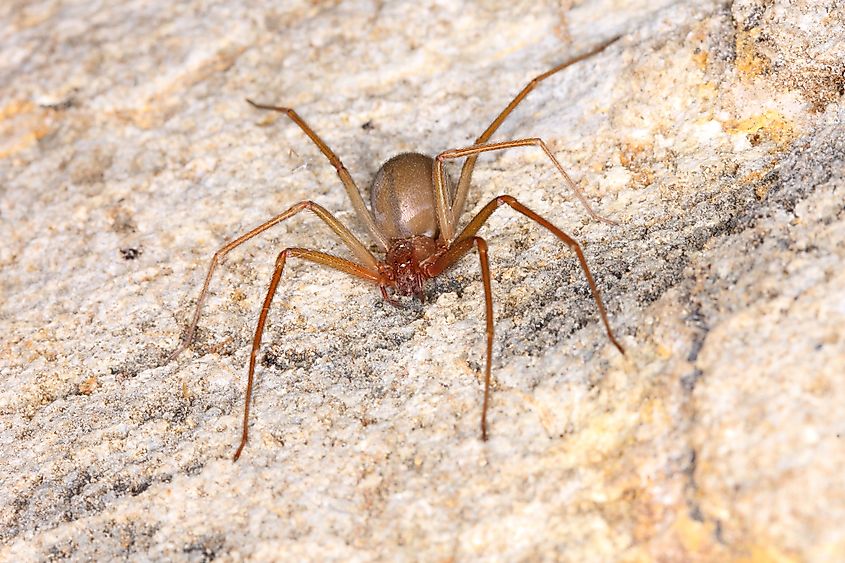
Close-up of a Brown Recluse Spider.
If you thought the Black Widow was the only fearsome arachnid in Mississippi, you were wrong. The Brown Recluse Spider may be even worse to get bitten by. Most often a yellowish-brown color, these spiders are known for having six eyes, the fiddle-shaped structure on their bodies, and their venom’s horrifying properties.
These spiders are most commonly found in the southern and central parts of the state. Bites from these spiders are rare, but the effects are horrifying. The bite may be initially painless, and victims may not even know they were bitten. What comes next has been known to vary from mild swelling and a bruise-like coloration of the wound to necrosis, also known as flesh-rotting disease.
American Black Bear
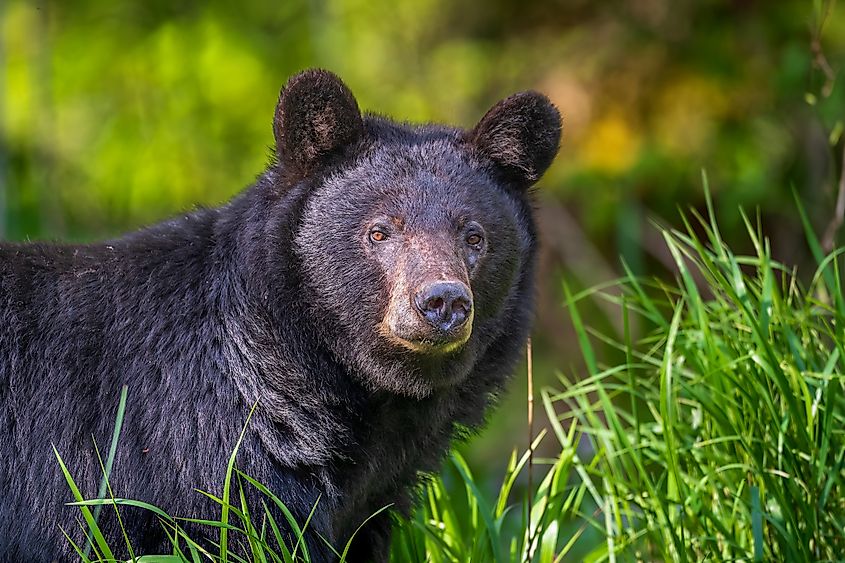
Black Bear in the Great Smoky Mountains National Park.
This animal is considered to be the far less aggressive version of its bigger, browner cousins. The American Black Bear is no teddy bear; however, it stands as high as 6 feet tall at full height and weighs as much as 600 pounds. Black bear attacks are fairly rare in the US, but these animals have killed over 60 Americans since 1900.
Still, these bears are typically cautious of humans and only generally wander over toward you if they are hungry or have been fed in the past. These animals live on the Gulf Coast, the Loess Bluffs in the state’s southwestern portion, and along the Mississippi River Delta. Make lots of noise if you encounter one, and pretend you are at a college football game. Go Ole Miss!
Eastern Coral Snake
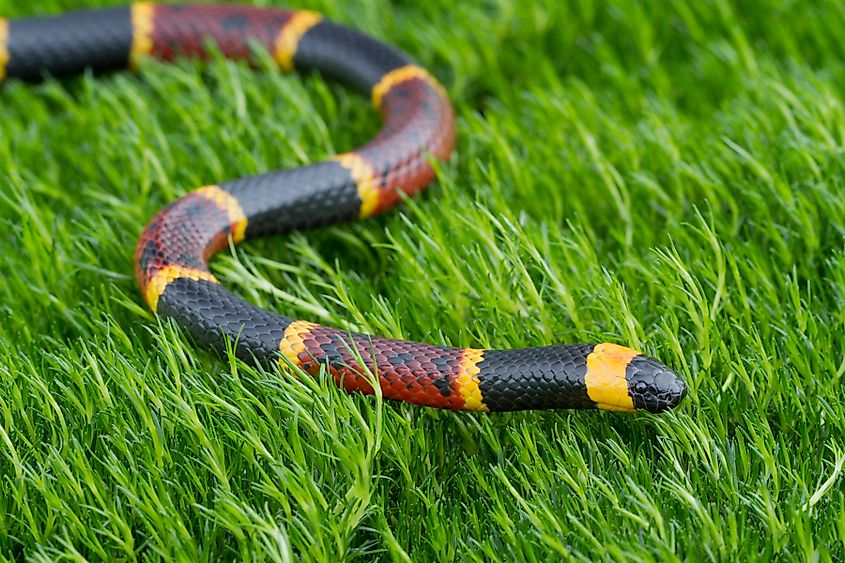
Venomous Eastern Coral Snake (Micrurus fulvius).
The dark horse of Mississippi’s deadly animals has to be the Eastern Coral Snake. This unassuming little snake can easily be misidentified with the harmless milk snake, but these two animals could not be more different. The Eastern Coral Snake has a distinctive coloring, with segments of its body alternating between black and yellowish-orange.
This coral snake has a particularly potent venom that causes paralysis, and deaths can occur because the body’s respiratory system fails due to the toxin. Within its body, this snake contains enough venom to kill five adult humans. Not sure which snake you have in front of you? Keep in mind the old rhyme: Red touches black, poison lacks. Red touches yellow and kills a fellow. These snakes can be found in sandy pinewoods in the state’s southern portion.
Deer
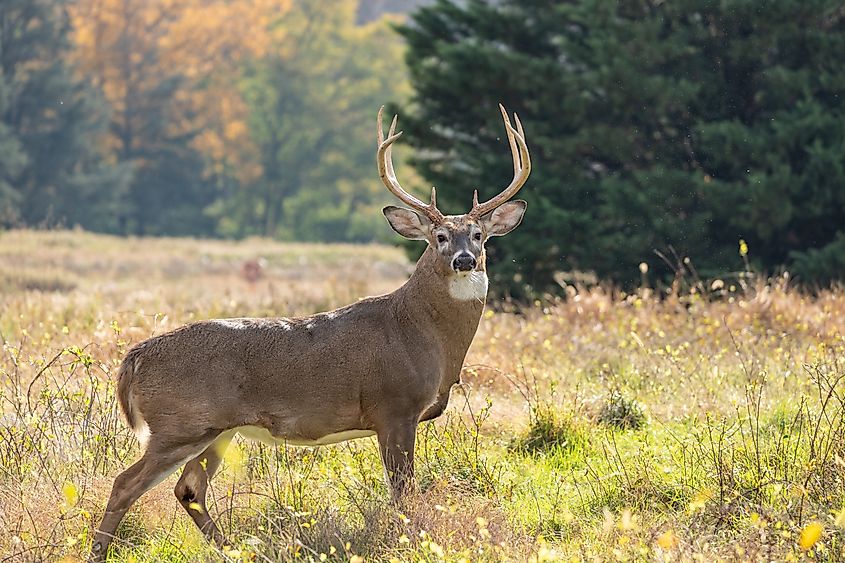
White-tailed Deer Buck in autumn.
Although these animals are marvelous to look at, the dangers posed by deer are significantly higher than they may seem at first. You are more likely to be killed by a deer than by any other animal, according to the CDC. Of the estimated 458 Americans killed in clashes with wildlife each year, deer are responsible for the vast majority of these deaths.
The reason? This is not due to rampaging bucks around mating season but by head-on vehicle collisions. White-tailed deer can be found throughout the entire state, and the population of Mississippi is thought to be around 1.5 million. Keep vigilant when driving and be on the lookout for signage warning of common deer crossings while driving.
Stay Safe While Exploring Mississippi
We hope highlighting Mississippi’s rogues gallery hasn’t put you off visiting this big, beautiful state. As the home of Elvis Presley and some of the best barbecue catfish on any side of the Mississippi River, this state has so much to offer first-time visitors and returning guests alike. Be sure to wear appropriate clothing when visiting the state’s rural areas and pack accordingly. A can of bug spray, long pants, and a keen sense of observation can go a long way in avoiding an unfortunate encounter with Mississippi’s wildlife.











